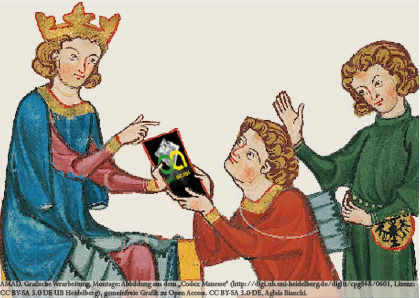AMAD
"Archivum Medii Aevi Digitale - Specialized open access repository for research in the middle ages"To submission

| Date: | 2012 |
| Title: | Die Transhumanz: zur Prozeßhaftigkeit einer agrarischen Wirtschaftsform |
| Author: | Zöbl, Dorothea |
| Description: | This study was devoted to the development of the transhumance in Spain, Italy, Southern France, and the Balkan countries. It elaborated an idealtype of evolution of transhumance within the context of medieval European economies. The ideal-type modes of organization range from the integration of sheep raising, in the business cycles of rural communities to the regulations for extensive migratory sheep raising by public institutions. The degrees of spatial interrelatedness, the separation of pastoral production and reproduction from the rural production and living units, and the disposition of the yields from transhumant sheep raising are used as criteria for characterizing each stage. Spatial relations between the places of rural and pastoral productions allege the labelling of the various stages: intra-local sheep raising (use of the common land; no supplementary pastures; division of labour between the members of the rural production unity; the head of the household is authorized to dispose of the surplus); inter-local migratory pastoral economy (supplementary pastures in different village lands; division of labour between shepherd and rural production unity; the shepherd's participation in surplus and income from sales); intra-regional migratory pastoral industry (supplementary pastures beyond the village, but within the same physiographic region; division of labour between shepherd and rural production unity or larger production unities; aside from them, owners of pasture grounds and landowners in regions through which flocks pass during their migrations participate in surplus and income from sales); inter-regional migratory pastoral industry (supplementary pastures in different physiographic regions, division of labour between shepherd and rural or larger economic unities or flock owners; also division of labour within the pastoral production unity; aside from shepherds, peasants, flock owners, owners of pasture grounds, and landowners in regions through which flocks pass during their migrations, the government or similar organizers of transhumance participate in surplus and income from sales). |
| URI: | https://www.amad.org/jspui/handle/123456789/64487 |
| Other Identifier: | http://www.ssoar.info/ssoar/handle/document/5208 https://doi.org/10.12759/hsr.10.1985.4.99-104 http://nbn-resolving.org/urn:nbn:de:0168-ssoar-52082 |
| AMAD ID: | 520601 |
| Appears in Collections: | BASE (Bielefeld Academic Search Engine) General history of Europe |

